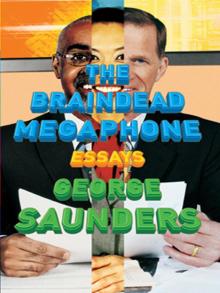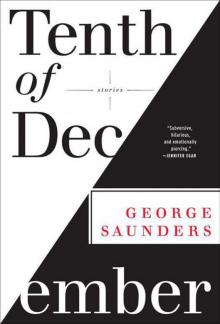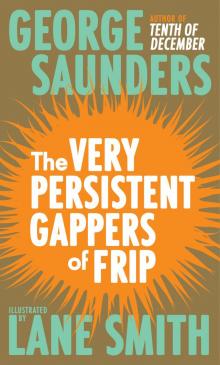- Home
- George Saunders
The Braindead Megaphone Page 2
The Braindead Megaphone Read online
Page 2
7.
So how did we get here? I think it went something like this: Elements on the right (Fox News, Rush Limbaugh, etc.) resuscitated an old American streak of simplistic, jingoistic, fear-based rhetoric that, in that post-9/11 climate of fear, infected, to a greater or lesser extent, the rest of the media. Remember Bill O’Reilly interrupting/ chastising/misrepresenting Jeremy Glick, whose father died on 9/11, finally telling Glick to shut up, cutting off his microphone? And a few months later, Diane Sawyer’s strange Mother Confessor interview/interrogation of the Dixie Chicks?
Ah, those were the days.
But also, those are the days, and the days yet to come. The basic illness in our media is not cured; it’s only that our fear has subsided somewhat. When the next attack comes, the subsequent swing to the Stalinesque will be even more extreme, having, as it will, the additional oomph of retrospective repentance of what will then be perceived as a period (i.e., now) of relapse to softness and terror-encouraging open discourse.
Have we gone entirely to hell? No: the media, like life, is complex and stratified, filled with heroes holding the line. (All hail Bill Moyers; all hail Soledad O’Brien, post-Katrina, losing her temper with FEMA Director Michael Brown.) But if we define the Megaphone as the composite of the hundreds of voices we hear each day that come to us from people we don’t know, via high-tech sources, it’s clear that a significant and ascendant component of that voice has become bottom-dwelling, shrill, incurious, ranting, and agenda-driven. It strives to antagonize us, make us feel anxious, ineffective, and alone; convince us that the world is full of enemies and of people stupider and less agreeable than ourselves; is dedicated to the idea that, outside the sphere of our immediate experience, the world works in a different, more hostile, less knowable manner. This braindead tendency is viral and manifests intermittently; while it is the blood in the veins of some of our media figures, it flickers on and off in others. It frequently sheds its political skin for a stroll through Entertainment Park, where it leers and smirks and celebrates when someone is brought low by, say, an absence of underwear or a drunken evening.
But why should this tendency be ascendant? Fear, yes, fear is part of it. In a time of danger, the person sounding the paranoid continual alarm will eventually be right. A voice arguing for our complete rightness and the complete wrongness of our enemies, a voice constantly broadening the definition of “enemy,” relieves us of the burden of living with ambiguity. The sensibility that generates a phrase like “unfortunate but necessary collateral damage” can, in the heat of the moment, feel like a kind of dark, necessary pragmatism.
But more than fear, our new braindeadedness has to do, I think, with commerce: the shift that has taken place within our major news organizations toward the corporate model, and away from the public-interest model. The necessity of profit is now assumed for our mass-media activities. This assumption has been shorn of all moral baggage: it is just something sophisticated people concede, so that other, more vital, discussions of “content” can begin.
Now, why aggressive, anxiety-provoking, maudlin, polarizing discourse should prove more profitable than its opposite is a mystery. Maybe it’s a simple matter of drama: ranting, innuendo, wallowing in the squalid, the exasperation of the already-convinced, may, at some crude level, just be more interesting than some intelligent, skeptical human being trying to come to grips with complexity, especially given the way we use our media: as a time-killer in the airport, a sedative or stimulant at the end of a long day.
In any event, the people who used to ask, “Is it news?” now seem to be asking, “Will it stimulate?” And the change is felt, high and low, throughout the culture.
Imagine a village. A nearby village, having grown a surplus of a certain vegetable that, when eaten, turns the skin red, cuts our village a deal on this vegetable. Within a few months, the average color of the people in our village will have moved toward the Red end of the spectrum. Within that general trend will be all sorts of variations and exceptions: this guy eats as much as he likes of that vegetable but just goes a little Pink; this woman, who can’t stand the taste of it, and never eats it, stays the same color as always. But in general, because of the omnipresence of that vegetable, the village is going to become Redder, and at the far end of the Gaussian curve folks will start looking downright demonic.
What, in this model, is the “vegetable”? What is “Red”?
The vegetable that has come to dominate our village is the profit motive.
“Red” is the resulting coarseness of our public rhetoric.
Now, profit is fine; economic viability is wonderful. But if these trump every other consideration, we will be rendered perma-children, having denied ourselves use of our higher faculties. With every grave-faced discussion of the disposition of the fetus within the body of its murdered mother, every interview with someone who knew the lawyer of an alleged close friend of some new Anna Nicole Smith, we become more clownish and bloated, and thereby more vulnerable.
In surrendering our mass storytelling function to entities whose first priority is profit, we make a dangerous concession: “Tell us,” we say in effect, “as much truth as you can, while still making money.” This is not the same as asking: “Tell us the truth.”
A culture’s ability to understand the world and itself is critical to its survival. But today we are led into the arena of public debate by seers whose main gift is their ability to compel people to continue to watch them.
8.
The generalizing writer is like the passionate drunk, stumbling into your house mumbling: I know I’m not being clear, exactly, but don’t you kind of feel what I’m feeling? If, generously overlooking my generalizations, your gut agrees with my gut in feeling that the nightly news may soon consist entirely of tirades by men so angry and inarticulate that all they do is sputter while punching themselves in the face, punctuated by videos of dogs blowing up after eating firecrackers, and dog-explosion experts rating the funniness of the videos—if you accept my basic premise that media is getting meaner and dumber—we might well ask, together: Who’s running this mess? Who’s making Sean Hannity’s graphics? Who’s booking the flights of that endless stream of reporters standing on the beach in the Bahamas, gravely speculating about the contents of a dead woman’s stomach?
Well, that would be us. Who runs the media? Who is the media? The best and brightest among us—the most literate and ambitious and gifted, who go out from their homes and off to the best colleges, and from there to the best internships, and from there to Offices throughout the nation, to inform us. They take the jobs they take, I suspect, without much consideration of the politics of their employer. What matters is the level of Heaven that employer occupies. The national is closer to God than the local; the large market looks down upon the small; the lately ratings-blessed floats slowly up, impressing the angels whose upward movement has fizzled out, because they work for losers.
There’s no conspiracy at work, I don’t think, no ill will, no leering Men Behind the Curtain: just a bunch of people from good universities, living out the dream, cringing a little at the dog-crap story even as they ensure that it goes out on time, with excellent production values.
How does such a harmful product emanate from such talented people? I’d imagine it has to do with the will to survive: each small piece of the machine doing what he or she must to avoid going home to Toledo, tail-between-legs, within the extant constraints of time and profitability, each deferring his or her “real” work until such time as he or she accumulates his or her nut and can head for the hills, or get a job that lets them honor their hearts. (A young friend who writes content for the news page of an online media giant, e-mails me: “I just wrote this news headline for my job: ‘Anna Nicole’s Lost Diary: “I Hate Sex.”’ If anyone wonders why Americans aren’t informed with real news it’s because of sell-out corporate goons like me who will do anything to never deliver a pizza again.”)
An assistant to a famous cons
ervative opinion-meister once described her boss to me, a little breathlessly and in the kind of value-neutral mode one hears in this milieu, as being one of the funniest, most intelligent, high-energy people she’d ever met. I believed her. To do what he does must take a special and terrifying skill set. Did she agree with his politics? She demurred—she did and she didn’t. It was kind of beside the point. He was kicking much ass. I immediately felt a little gauche for asking about her politics, like a guy who, in the palace, asks how much the footman makes.
The first requirement of greatness is that one stay in the game. To stay in the game, one must prove viable; to prove viable, one has to be watched; to be watched, one has to be watchable, and, in the news business, a convention of Watchability has evolved—a tone, a pace, an unspoken set of acceptable topics and acceptable relations to these topics—that bears, at best, a peripheral relation to truth. What can be said on TV is circumscribed, subtly, by past performance, editing, and social cues, and, not so subtly, by whether one is invited back.
This entity I’m trying to unify under the rubric of The Megaphone is, of course, in reality, a community tens of thousands of people strong, and like all communities, it is diverse, and resistant to easy generality, and its ways are mysterious.
But this community constitutes a kind of de facto ruling class, because what it says we can’t avoid hearing, and what we hear changes the way we think. It has become a kind of branch of our government: when government wants to mislead, it turns to the media; when media gets hot for a certain story (i.e., senses a ratings hot spot), it influences the government. This has always been true, but more and more this relationship is becoming a closed loop, which leaves the citizen extraneous. Like any ruling class, this one looks down on those it rules. The new twist is that this ruling class rules via our eyes and the ears. It fills the air, and thus our heads, with its priorities and thoughts, and its new stunted diction.
This is a ruling class made of strange bedfellows: the Conservative Opinion King has more in common with the Liberal Opinion King than either does with the liberal and conservative slaughterhouse workers toiling side by side in Wichita; the Opinion Kings have friends in common, similar ambitions, a common frame of reference (agents, expected perks, a knowledge of the hierarchy of success indicators, a mastery of insider jargon). What they share most is a desire not to be cast down, down from the realm of the rarefied air, back to where they came from.
There’s a little slot on the side of the Megaphone, and as long as you’re allowed to keep talking into it, money keeps dropping out.
Seasons pass. What once would have evoked an eye-roll evokes a dull blink. New truisms, new baselines, arise. A new foundation, labeled Our Basic Belief System, is laid, and on this foundation appear startling new structures: a sudden quasi acceptance of, say, the water-boarding of prisoners, or of the idea that a trial is a privilege we may choose to withhold if we deem the crime severe enough.
9.
At this point I hear a voice from the back of the room, and it is mine: “Come on, George, hasn’t our mass media always been sensationalistic, dumb, and profit-seeking?”
Of course it has. If you want a tutorial on stupid tonality, watch an old newsreel (“These scrappy Southern Yanks are taking a brisk walk toward some Krauts who’ll soon be whistling Dixie out of the other side of Das Traps!”). We were plenty able to whip ourselves into murderous frenzies even when the Megaphone was a baby, consisting of a handful of newspapers (Hi, Mr. Hearst!), and I suppose if we went back far enough, we’d find six or seven troglodytes madly projecting about a village of opposing troglodytes, then jogging down there, hooting pithy slogans, to eliminate it on the fallacious power of their collective flame-fanning.
But I think we’re in an hour of special danger, if only because our technology has become so loud, slick, and seductive, its powers of self-critique so insufficient and glacial. The era of the jackboot is over: the forces that come for our decency, humor, and freedom will be extolling, in beautiful smooth voices, the virtue of decency, humor, and freedom.
Imagine that the Megaphone has two dials: One controls the Intelligence of its rhetoric and the other its Volume. Ideally, the Intelligence would be set on High, and the Volume on Low—making it possible for multiple, contradictory voices to be broadcast and heard. But to the extent that the Intelligence is set on Stupid, and the Volume on Drown Out All Others, this is verging on propaganda, and we have a problem, one that works directly against the health of our democracy.
Is there an antidote?
Well, there is, but it’s partial, and may not work, and isn’t very exciting. Can we legislate against Stupidity? I don’t think we’d want to. Freedom means we have to be free to be Stupid, and Banal, and Perverse, free to generate both Absalom, Absalom!, and Swapping Pets: The Alligator Edition. Freedom means that if some former radio DJ can wrestle his way to the top of the heap and provoke political upheavals by spouting his lame opinions and bullying his guests, he too has a right to have a breakfast cereal named after him. American creative energy has always teetered on the brink of insanity. “Rhapsody in Blue” and “The Night Chicago Died” have, alas, common DNA, the DNA for “joyfully reckless confidence.” What I propose as an antidote is simply: awareness of the Megaphonic tendency, and discussion of same. Every well-thought-out rebuttal to dogma, every scrap of intelligent logic, every absurdist reduction of some bullying stance is the antidote. Every request for the clarification of the vague, every poke at smug banality, every pen stroke in a document under revision is the antidote.
This battle, like any great moral battle, will be won, if won, not with some easy corrective tidal wave of Total Righteousness, but with small drops of specificity and aplomb and correct logic, delivered titrationally, by many of us all at once.
We have met the enemy and he is us, yes, yes, but the fact that we have recognized ourselves as the enemy indicates we still have the ability to rise up and whip our own ass, so to speak: keep reminding ourselves that representations of the world are never the world itself. Turn that Megaphone down, and insist that what’s said through it be as precise, intelligent, and humane as possible.
THE NEW MECCA
PUT THAT STATELY PLEASURE PALACE THERE BETWEEN THOSE OTHER TWO
If you are like I was before I went to Dubai, you may not know exactly where Dubai is. Near Venezuela? No, sorry, that is incorrect. Somewhere north of Pakistan, an idyllic mountain kingdom ruled by gentle goatherds? Well, no.
Dubai, actually, is in the United Arab Emirates, on the Arabian Peninsula, one hundred miles across the Gulf from Iran, about six hundred miles from Basra, eleven hundred from Kabul.
You might also not know, as I did not know, what Dubai is all about or why someone would want to send you there. You might wonder: Is it dangerous? Will I be beheaded? Will I need a translator? Will my translator be beheaded? Just before we’re beheaded, will my translator try to get out of it by blaming everything on me?
No, no, not to worry. Dubai, turns out, is quite possibly the safest great city in the world. It is also the newest great city in the world. In the 1950s, before oil was discovered there, Dubai was just a cluster of mud huts and Bedouin tents along Dubai Creek: the entire city has basically been built in the last fifty years. And actually, the cool parts—the parts that have won Dubai its reputation as “the Vegas of the Middle East” or “the Venice of the Middle East” or “the Disney World of the Middle East, if Disney World were the size of San Francisco and out in a desert”—have been built in the last ten years. And the supercool parts—the parts that, when someone tells you about them, your attention drifts because these morons have to be lying (no one dreams this big or has that much available capital)—those parts are all going to be built in the next five years.
By 2010, if all goes according to plan, Dubai will have: the world’s tallest skyscraper (2,300 feet), largest mall, biggest theme park, longest indoor ski run, most luxurious underwater hotel (accessible by submarine trai
n); a huge (2,000-acre, 60,000-resident) development called International City, divided into nation-neighborhoods (England, China, France, Greece, etc.) within which all homes will be required to reflect the national architectural style; not to mention four artificially constructed island mega-archipelagoes (three shaped like giant palm trees, the fourth like a map of the world) built using a specially designed boat that dredges up tons of ocean-bottom sand each day and sprays it into place.
Before I saw Dubai for myself, I assumed this was bluster: brag about ten upcoming projects, finally build one—smaller than you’d bragged—hope everyone forgets about the other nine.
But no.
I’ve been to Dubai, and I believe.
If America was looking for a pluralistic, tax-free, laissez-faire, diverse, inclusive, tolerant, no-holds-barred, daringly capitalist country to serve as a shining City on the Hill for the entire Middle East, we should have left Iraq alone and sponsored a National Peaceful Tourist Excursion to Dubai and spent our ninety quadrillion Iraq War dollars there.
Maybe.
IN WHICH I FALL IN LOVE WITH A FAKE TOWN
From the air, Dubai looked something like Dallas circa 1985: a vast expanse of one-or two-story white boxes, punctuated by clusters of freakish skyscrapers. (An Indian kid shouted, “Dad, looks like a microchip!”) Driving in from the airport, you’re struck by the usual first-night-in-new-country exotica (“There’s a Harley-Davidson dealership—right in the Middle East!”), and the skyscraper clusters were, OK, odd-looking (like four or five architects had staged a weird-off, with unlimited funds)—but all in all, it was, you know, a city. And I wondered what all the fuss was about.

 The Braindead Megaphone
The Braindead Megaphone Fox 8
Fox 8 Tenth of December: Stories
Tenth of December: Stories Lincoln in the Bardo
Lincoln in the Bardo Pastoralia
Pastoralia In Persuasion Nation
In Persuasion Nation The Very Persistent Gappers of Frip
The Very Persistent Gappers of Frip Escape From Spiderhead
Escape From Spiderhead CivilWarLand in Bad Decline
CivilWarLand in Bad Decline Home
Home Fox 8: A Story (Kindle Single)
Fox 8: A Story (Kindle Single) CivilWarLand in Bad Decline: Stories and a Novella
CivilWarLand in Bad Decline: Stories and a Novella